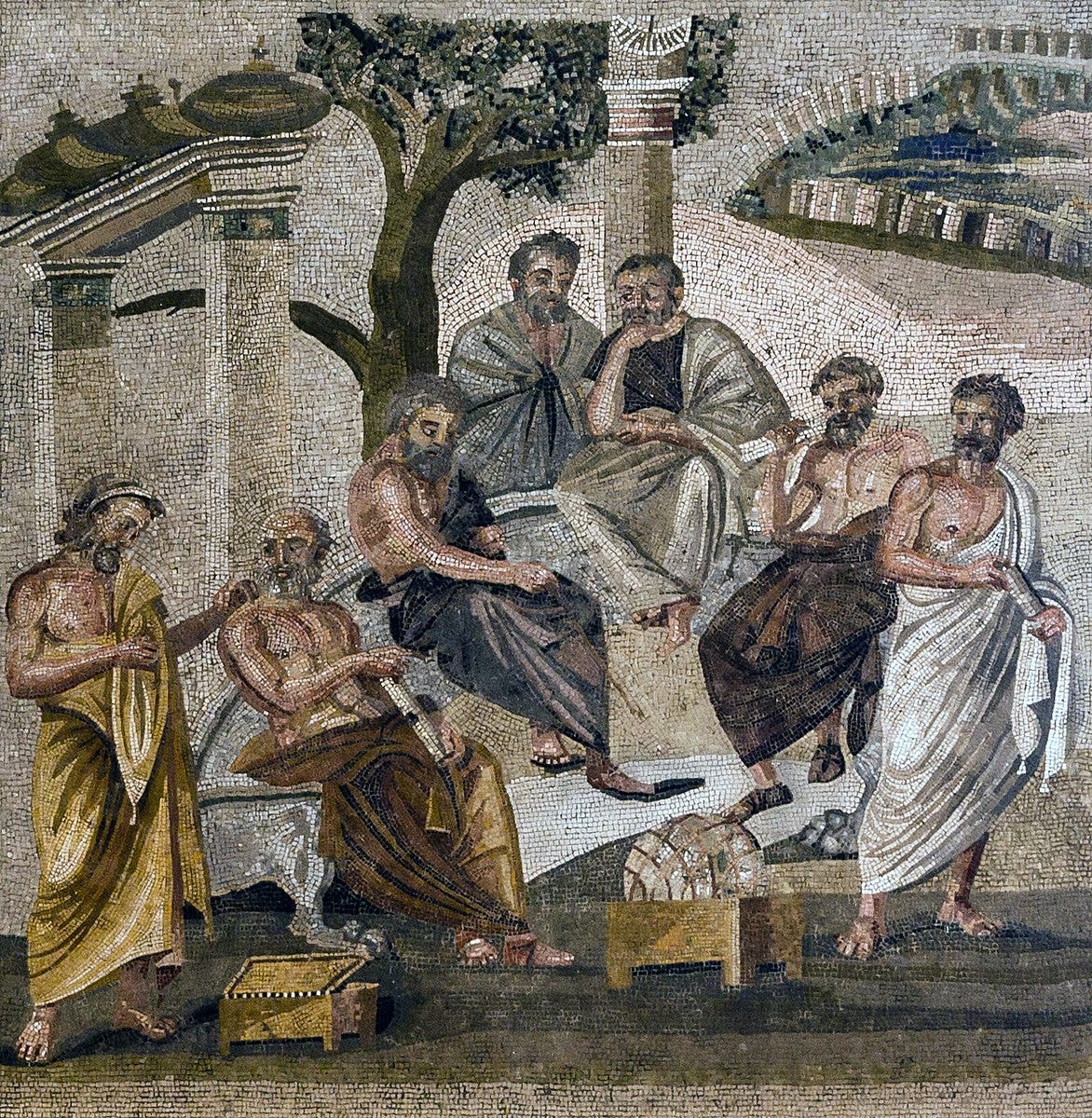Four Premises for Wisdom Commons Midwifery
I define a “wisdom commons” simply as “a place that makes wisdom more common.” I had the opportunity to share this idea at two para-academic conferences this year, presenting under the title “Midwifing a Wisdom Commons.”
The midwife phrase is an homage to Socrates, who considered himself a spiritual midwife to the men he philosophized with:
My art of midwifery is in general like theirs [real midwives]; the only difference is that my patients are men, not women, and my concern is not with the body but with the soul that is in travail of birth. And the highest point of my art is the power to prove by every test whether the offspring of a young man's thought is a false phantom or instinct with life and truth. I am so far like the midwife that I cannot myself give birth to wisdom, and the common reproach is true, that, though I question others, I can myself bring nothing to light because there is no wisdom in me.
Like Socrates, I acknowledge my lack of wisdom but feel compelled to assist others in their journey toward greater wisdom, the antithesis of foolishness. During my recent presentation, I shared four fundamental premises that shape my current approach to fostering a wisdom commons:
A wisdom commons is found in relationships, not propositions.
Multiple wisdom commons will compete against each other.
It is wiser to become less foolish instead of more wise, which avoids “wisdom signaling.”
Approach the wisdom commons as a work of art.
I’ll expand on these premises below, providing my latest philosophical musings on each …
A wisdom commons is found in relationships, not propositions.
Wisdom will not be encoded into words that are “bearers of truth,” universally accepted, and readily replicated. It will be located “in the middle,” between bodies, with provisional words, shape-shifting with people who can adapt to their surroundings.
My take on the phrase “the next Buddha is the sangha” is “the next sage is The Stoa” because we need collective wisdom today, not more gurus or galaxy brains bamboozling us with their impressive spiritual capacities or philosophical systems. No. It is time for us to become the guides.
Multiple wisdom commons will compete against each other.
A scene emerged from “The Liminal Web” called “The Wisdom Web,” which includes people like Bonnitta Roy, John Vervaeke, Layman Pascal, Zak Stein, and Soryu Forall of Monastic Academy. Nathan Vanderpool from Respond Network calls them “scholarchs,” a term referring to heads of schools of philosophy in ancient Greece.
While these scholarchs have many high-level agreements, they have deep philosophical disagreements. These disagreements will ripple out, shaping the theories and practices they believe are needed to see wisdom becoming more common.
I say let them compete. I do not believe in the kumbaya approach, where everyone who thinks wisdom is the response to our greatest challenges will be holding hands, skipping toward making wisdom more common. If they approach this competition with wisdom, it will be a non-zero-sum competition, specifically a positive-sum (“win-win”) one.
May the best wisdom commons win, or less foolishly said, infinitely play.
It is wiser to become less foolish instead of more wise, which avoids “wisdom signaling.”
In becoming less foolish, one has to be confronted with how foolish they really are, in an embodied way, or what I call “foolbodied.” This foolishness also needs to be wholesome, reaching for the whole. Once someone becomes wholly foolish, they can be considered whole fools; the historical term for this is “holy fools” or “fool-saints,” who have a “foolishness for Christ.”
It is this degree of foolishness that gives wisdom a chance. The risk of talking about wisdom as an epistemic authority or communicating in a manner that may sound wise, regardless of the actual presence of wisdom, leads to what is known as "wisdom signaling."
The risk of wisdom signaling is that it can lead to “wisdom cults,” aka cult-like dynamics surrounding a person and their teachings and practices. Given the asymmetry of capacities and communication of those who often speak about wisdom, they could gather a following that becomes cult-like.
The less foolish approach avoids such pitfalls, or at least I hope it does. One can engage in “foolish signaling,” of course, as a humblebrag for the concealed wisdom they want others to think they have. However, I believe that ruse will only go so far and will not fool those who have the discernment to be attracted to a less foolish approach in the first place.
Approach the wisdom commons as a work of art
In an interview with ArtReview, my favorite philosopher, Byung-Chul Han, concluded with the following:
Philosophers are no longer interested in the present. Foucault once said that the philosopher is a journalist who captures the now with ideas. That’s what I do. Moreover my essays are on their way to another life, to a different narrative. Artists feel addressed by that. I would entrust art with the task of developing a new way of life, a new awareness, a new narrative against the prevailing doctrine. As such, the saviour is not philosophy but art. Or I practise philosophy as art.
I wholeheartedly (and whole-foolishly) agree. I believe those who consider themselves “artists of life” (Hadot) and who do “life art” (Harris) will be the ones making wisdom - the art of living - more common. This could be foolish to believe, and perhaps a more rational approach with scientific rigor is wiser.
Deep within our philosophical foundations lie presuppositions, some more thoroughly examined than others. Nevertheless, we have to bet on something. I am betting on a creative impulse that feels primordial, demanding me to create, regardless if what I am creating is not conventionally considered “art.”
The beautiful thing about real art, similar to real love, is that it does not need to justify itself.
If you found this entry worthwhile, and want to be a part of the wisdom commons midwifery, forward it to a friend, ask them to read it and discuss it over coffee. When you meet, converse about how you can make wisdom more common or at least become mutually less foolish together. A wisdom commons is found in relationships, not propositions.
Comments are enabled for paid subscribers for this entry.




